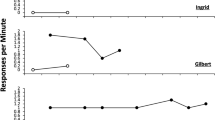Abstract
The present research was designed to investigate the correspondence between the phenomenological definition of helplessness and its laboratory analogue—the learned helplessness paradigm. In experiment 1, subjects were exposed to unsolvable, solvable, or no problems. It was found that exposure to unsolvable problems increased the report of helplessness feelings and impaired subsequent performance. In addition, experiment 1 demonstrated a negative and significant correlation between performance and the report of helplessness feelings. Experiment 2 isolated the cognitive component of helplessness by measuring the amount of expectancy changes following success and failure. The amount of expectancy changes was negatively correlated with the belief in an outcome's uncontrollability. Finally, experiment 3 showed that exposure to only one unsolvable problem was associated with the reports of coping and anger feelings, whereas exposure to four unsolvable problems was related to surrender feelings. These results demonstrated that laboratory-induced helpless situations elicit the same feelings as real-life helplessness situations.
Similar content being viewed by others
References
Abramson, L. Y., Seligman, M. E. P., & Teasdale, J. (1978). Learned helplessness in humans: Critique and reformulation.Journal of Abnormal Psychology, 87 49–74.
Anderson, C. A., & Arnoult, L. H. (1985). Attributional style and everyday problems in living: Depression, loneliness, and shyness.Social Cognition, 3 16–35.
Atkinson, J. W., & Feather, N. T. (Eds.). (1966).A theory of achievement motivation. New York: Wiley.
Baum, A., & Gatchel, R. J. (1981). Cognitive determinants of reactions to uncontrollable events.Journal of Personality and Social Psychology, 40 1078–1089.
Bibring, E. (1953). The mechanism of depression. In P. Greenacre (Ed.),Affective disorders: Psychoanalytic contributions to their study. New York: International Universities Press.
Brunstein, J. C., & Olbrich, E. (1985). Personal helplessness and action control: Analysis of achievement-related cognitions, self-assessments, and performance.Journal of Personality and Social Psychology, 48 1540–1551.
Feather, N. T. (1961). The relationship of persistence at a task, expectations of success and achievement related motives.Journal of Abnormal and Social Psychology, 63 552–561.
Feather, N. T. (1962). The study of persistence.Psychological Bulletin, 59 94–115.
Hiroto, D. S., & Seligman, M. E. P. (1975). Generality of learned helplessness in man.Journal of Personality and Social Psychology, 31 311–327.
Klinger, E. (1975). Consequences of commitment to and disengagement from incentives.Psychological Review, 82 1–25.
Kuhl, J. (1981). Motivational and functional helplessness: The moderating effect of state vs. action-orientation.Journal of Personality and Social Psychology, 40 155–170.
Lubow, R. E., Rosenblat, R., & Weiner, I. (1981). Confounding of controllability in the triadic design for demonstrating learned helplessness.Journal of Personality and Social Psychology, 41 458–469.
Maier, S. F., & Seligman, M. E. P. (1976). Learned helplessness: Theory and evidence.Journal of Experimental Psychology: General, 105 3–46.
Mandler, G. (1972). Helplessness: Theory and research in anxiety. In C. D. Spielberger (Ed.),Anxiety: Current trends in theory and research. New York: Academic Press.
Miller, W. R., & Seligman, M. E. P. (1973). Depression and the perception of reinforcement.Journal of Abnormal Psychology, 82 62–73.
Miller, W. R., & Seligman, M. E. P. (1975). Depression and learned helplessness in humans.Journal of Abnormal Psychology, 84 228–238.
Pittman, N. L., & Pittman, T. S. (1979). Effects of amount of helplessness training and internal-external locus of control on mood and performance.Journal of Personality and Social Psychology, 37 39–47.
Raven, J. C. (1960).Standard progressive matrices. London: H. K. Lewis.
Rizley, R. (1978). Depression and distortion in the attribution of causality.Journal of Abnormal Psychology, 87 32–48.
Rotter, J. B., Chance, I. E., & Phares, E. J. (1972).Applications of a social learning theory of personality. New York: Holt, Rinehart & Winston.
Roth, S., & Bootzin, R. R. (1974). Effects of experimentally induced expectancies of external control: An investigation of learned helplessness.Journal of Personality and Social Psychology, 29 253–264.
Steiner, I. D. Perceived freedom. (1970). In L. Berkowitz (Ed.),Advances in experimental social psychology (Vol. 5). New York: Academic Press.
Van Kaam, A. L. (1966).Existential foundation of psychology. Pittsburgh: Duquesne University Press.
Weiner, B. (1972).Theories of motivation: From mechanism to cognition. Chicago: Rand McNally.
Wortman, C. B., & Brehm, J. W. (1975). Responses to uncontrollable outcomes: An integration of reactance theory and the learned helplessness model. In L. Berkowitz (Ed.),Advances in experimental social psychology (Vol. 8). New York: Academic Press.
Wortman, C. B., & Dintzer, L. (1978). Is an attributional analysis of the learned helplessness phenomenon viable? A critique of the Abramson-Seligman-Teasdale reformulation.Journal of Abnormal Psychology, 87 75–90.
Author information
Authors and Affiliations
Additional information
The study was conducted by the first author in partial fulfillment of the requirements for the M.A. degree at Bar Ilan University under the supervision of Prof. R. E. Lubow.
Rights and permissions
About this article
Cite this article
Mikulincer, M., Caspy, T. The conceptualization of helplessness: II. Laboratory correlates of the phenomenological definition of helplessness. Motiv Emot 10, 279–294 (1986). https://doi.org/10.1007/BF00992321
Issue Date:
DOI: https://doi.org/10.1007/BF00992321




